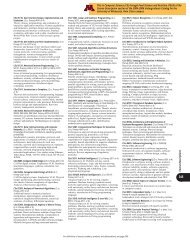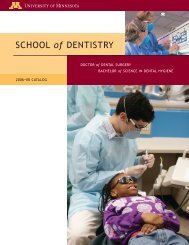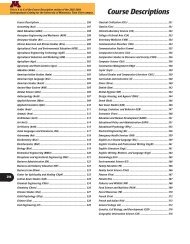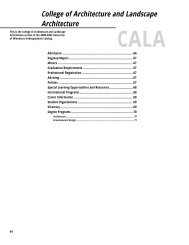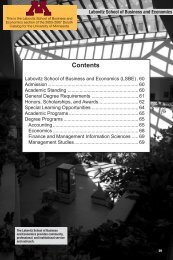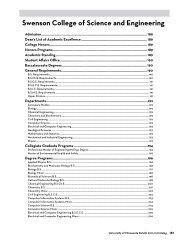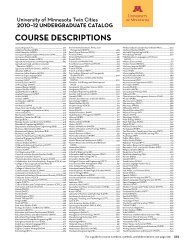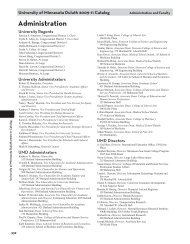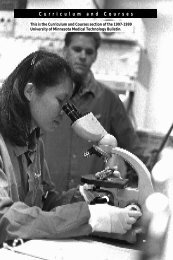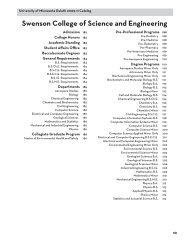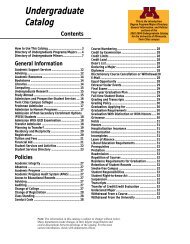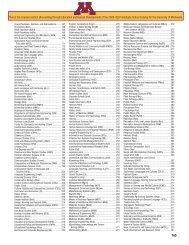R e s e a r c h a n d T e a c h i n g F a c i l i t i e s - University Catalogs
R e s e a r c h a n d T e a c h i n g F a c i l i t i e s - University Catalogs
R e s e a r c h a n d T e a c h i n g F a c i l i t i e s - University Catalogs
You also want an ePaper? Increase the reach of your titles
YUMPU automatically turns print PDFs into web optimized ePapers that Google loves.
RESEARCH AND TEACHING FACILITIES<br />
biology, membrane biology, molecular<br />
genetics, and protein structure and function as<br />
they relate to biological process technology.<br />
The BPTI Bioprocessing Pilot Facility is a<br />
shared-use facility, a <strong>University</strong>-wide<br />
laboratory equipped with state-of-the-art<br />
equipment to facilitate research in fermentation,<br />
animal and plant cell culture technology, and<br />
large-scale separation of biological molecules.<br />
BPTI promotes collaboration between<br />
<strong>University</strong> researchers and industry, meeting<br />
increasing demands for students trained jointly<br />
in biological and engineering disciplines (612/<br />
624-6774).<br />
Institute of Human Genetics—The institute’s<br />
major objective is to develop an<br />
interdisciplinary approach to the study and<br />
application of new developments in human<br />
genetics. It develops technologies necessary for<br />
understanding the structure, function, and<br />
expression of human chromosomes and genes<br />
for the prevention, diagnosis, and therapy of<br />
inborn and acquired genetic disorders. The<br />
institute’s genetic programs include genetic<br />
services (Molecular Diagnostics Laboratory,<br />
microchemical facility, gene therapy program);<br />
molecular, behavioral, clinical, and population<br />
genetics; and the Genetic Counseling Program;<br />
(612/624-3110).<br />
Lake Itasca Forestry and Biological<br />
Station—Located at the headwaters of the<br />
Mississippi River in northern Minnesota, the<br />
field station is in an unparalleled ecological<br />
area where three great plant regions of the<br />
United States meet. These 50 square miles of<br />
protected forest provide unique opportunities<br />
for the study of varied ecosystems and of fauna<br />
and flora with southern, northern, and western<br />
origins. Diverse lakes and wetlands provide<br />
unusual field advantages for aquatic studies.<br />
Information about the highly popular summer<br />
biology offerings is in the Summer Session<br />
Bulletin. Reservations for and questions about<br />
the Itasca program should be addressed to the<br />
Director, Itasca Biology Program, <strong>University</strong> of<br />
Minnesota, 303 Ecology Building, 1987 Upper<br />
Buford Circle, St. Paul MN 55108 (612/624-<br />
6743).<br />
Instructional Computing Center—Biology<br />
students have access to a well-equipped<br />
Macintosh computing facility in 406 Biological<br />
Sciences Center and a Windows facility in 170<br />
Ecology Building. Priority in the computer<br />
center is given to undergraduates working on<br />
course-related materials. Students can use<br />
programs for word processing, graphing,<br />
drawing, or spreadsheets. Students can also<br />
access many electronic databases and file<br />
servers around the world, as well as their own<br />
electronic mail service. The center houses<br />
specialized software, such as programs to help<br />
students prepare for the Graduate Record<br />
Examination (GRE). Hours for each computing<br />
lab are posted on the lab doors.<br />
Advanced Bioscience Computing Center<br />
(ABCC)—Located in 247 Gortner Laboratory,<br />
the center serves more than 110 labs with<br />
advanced nucleic acid and peptide sequence<br />
analysis software. Molecular graphics facilities<br />
permit specialized research on the structure and<br />
function of DNA, RNA, and proteins. Student<br />
computers are available, as are workshops, a<br />
help line, and consulting. For more information,<br />
call (612) 625-9284.<br />
Plant Molecular Genetics Institute—The<br />
institute fosters research in molecular biology<br />
and genetics of economically important plants<br />
and relevant model plant systems, develops<br />
genetic engineering methodologies for<br />
application to crop improvement, educates<br />
future plant biology researchers and teachers,<br />
maintains an interdisciplinary environment in<br />
which to explore and develop new ideas and<br />
experimental approaches in plant molecular<br />
biology, and provides a focus for external<br />
communication to aid recruitment and funding.<br />
Institute faculty come from two colleges<br />
(Biological Sciences and Agricultural, Food,<br />
and Environmental Sciences) and six<br />
departments (agronomy and plant genetics,<br />
biochemistry, genetics and cell biology,<br />
horticultural science, plant biology, and plant<br />
pathology). The institute supports seminars and<br />
symposia on topics related to plant molecular<br />
biology and provides funds for speakers and<br />
visiting scientists (612/625-3129).<br />
50



